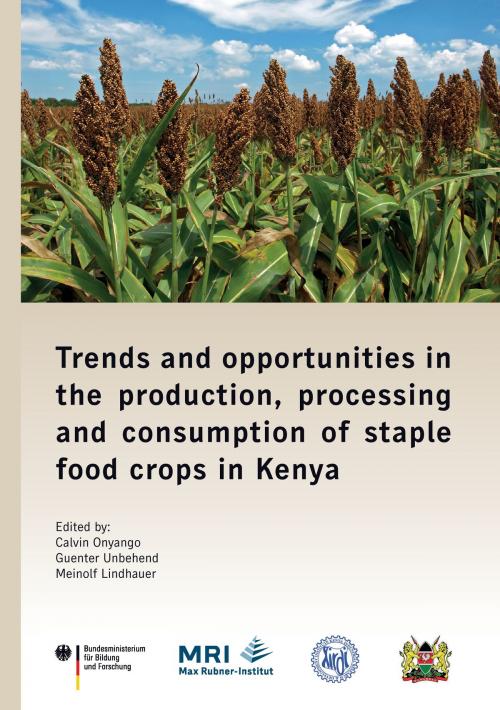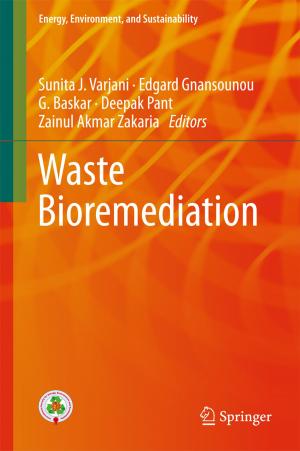Trends and opportunities in the production, processing and consumption of staple food crops in Kenya
Nonfiction, Science & Nature, Technology, Engineering, Chemical & Biochemical| Author: | ISBN: | 9783944331263 | |
| Publisher: | TUDpress Verlag der Wissenschaften GmbH | Publication: | October 19, 2013 |
| Imprint: | Language: | English |
| Author: | |
| ISBN: | 9783944331263 |
| Publisher: | TUDpress Verlag der Wissenschaften GmbH |
| Publication: | October 19, 2013 |
| Imprint: | |
| Language: | English |
The objective of the national conference on Trends and opportunities in the production, processing and consumption of staple food crops in Kenya was to communicate the findings of a two-year research project to academic peers, industrialists, policy-makers and regulatory officials. The aim of the project was to investigate the potential of utilizing sorghum and cassava to make gluten-free bread (i.e. bread from non-wheat flours) and composite bread (i.e. bread from wheat and non-wheat flours). Bread was selected as the vehicle to promote these crops because it is a ubiquitous food product that is eaten across all social classes, is culturally accepted across the country and is convenient to handle, store and consume. Some results of this project are presented in Chapter 1 and 3. The project was undertaken by the Food Technology Division at Kenya Industrial Research and Development Institute (KIRDI, Nairobi, Kenya), and the Department of Safety and Quality of Cereals at Max Rubner-Institut (MRI, Detmold, Germany). The project (Project No.: KEN 10/001) and conference were supported by Bundesministerium für Bildung und Forschung / Federal German Ministry of Education and Research (BMBF, Germany) and Ministry of Industrilaization and Enterprise Development, Kenya. Additional financial support was provided by Deutscher Akademischer Austausch Dienst (DAAD) to enable DAAD-Alumni attend the conference. We were aware that several other research activities, technology transfer initiatives and policy recalibration efforts are ongoing in the country to develop a vibrant staple food crops sector. It is for this reason that we invited contributions from other stakeholders. The contributions addressed policy and regulation, research, extension, production, processing and consumption of staple food crops in Kenya. Full-length articles of some of the presentations made at the conference are presented in this book.
The objective of the national conference on Trends and opportunities in the production, processing and consumption of staple food crops in Kenya was to communicate the findings of a two-year research project to academic peers, industrialists, policy-makers and regulatory officials. The aim of the project was to investigate the potential of utilizing sorghum and cassava to make gluten-free bread (i.e. bread from non-wheat flours) and composite bread (i.e. bread from wheat and non-wheat flours). Bread was selected as the vehicle to promote these crops because it is a ubiquitous food product that is eaten across all social classes, is culturally accepted across the country and is convenient to handle, store and consume. Some results of this project are presented in Chapter 1 and 3. The project was undertaken by the Food Technology Division at Kenya Industrial Research and Development Institute (KIRDI, Nairobi, Kenya), and the Department of Safety and Quality of Cereals at Max Rubner-Institut (MRI, Detmold, Germany). The project (Project No.: KEN 10/001) and conference were supported by Bundesministerium für Bildung und Forschung / Federal German Ministry of Education and Research (BMBF, Germany) and Ministry of Industrilaization and Enterprise Development, Kenya. Additional financial support was provided by Deutscher Akademischer Austausch Dienst (DAAD) to enable DAAD-Alumni attend the conference. We were aware that several other research activities, technology transfer initiatives and policy recalibration efforts are ongoing in the country to develop a vibrant staple food crops sector. It is for this reason that we invited contributions from other stakeholders. The contributions addressed policy and regulation, research, extension, production, processing and consumption of staple food crops in Kenya. Full-length articles of some of the presentations made at the conference are presented in this book.















